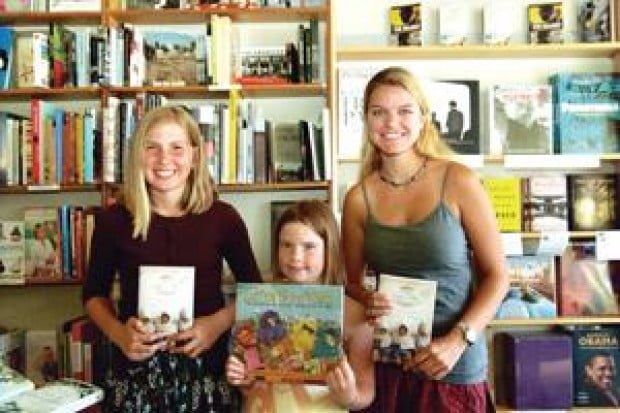
Megan Howlett, Kelsey Homes and Crystal Graham are this year’s winners of the essay writing contest sponsored by Diesel, A Bookstore, as part of the month long One Book, One City – Malibu event, with “Three Cups of Tea” by Greg Mortenson as the reading selection. Below is Howlett’s essay reprinted.
Scimitar
We do not notice the dirt. It covers our village, our houses, the bottoms of our bare feet. It is perpetually burrowed under our fingernails. Dirt is as much a part of our life as food, or sleep, or breathing.
The first time I noticed the film of earth on my body, truly noticed it, was the first day I saw the American. Startled and shy, I dropped my eyes from his and stared at my hands, which were tightly clenched to one another. The dried dirt on them formed patterns, small swirls that could have been beautiful in another context. I did not see the beauty; I merely saw the contrast between the stranger’s pale cleanliness and my dirty hands.
I had never given much thought to my lifestyle, to my future. The role of a female is difficult in my village, but so, too, is the role of a male. Each has its privileges; each has its duties. I had not rebelled against the concept that education was only for boys. It was not as though it was easy for them. They struggled, kneeling on the frozen earth, to make sense of their lessons. I did not envy them.
At first I did not understand the excitement surrounding the announcement of the school. A bridge, I could understand. But so much money, so much time, for a school? My mother’s quiet pride at the potential of an educated daughter and my father’s absentminded rubbing of a sore muscle after long days of carting supplies peaked my curiosity.
The walk to my first day of school was full of uncertainty and conflicting emotion. Why should I require an education when my mother could surely use my hands in labor at home? What if it was too difficult for me? I could not read the Koran in Arabic, let alone anything in English. I was consumed with anxiety, yet amidst the dull pain of nervousness in my stomach, there were sparks of something else. Excitement, I realized. I was excited.
Today, I sit in the same school building and smile back at the memory. Education is seen by many as a linear process, a transport from one point to another with a specific ending position of accomplishment. Like climbing a mountain merely to reach the summit, I think, reflecting on the former mountaineer who is certainly no longer a stranger.
I write a perfect letter “C” on my slate and sit back in satisfaction, adjusting my headscarf to be sure my hair is not showing. When I first learned to write a “C,” it reminded me of the crescent of Islam, and also of the curved blade of a scimitar. Education, also, reminds me of a scimitar now. There is the sharpness, the contrast, and the power, of course. But more important is the arc. The further it extends from its base, the more it reaches back for its origin.
I do not expect to become a doctor, or a lawyer, or a scientist. I do not want to be any of these things. I do not feel the desire to leave my village to settle in a larger city or a different country. I want to stay here, to raise children and contribute to the community. Though once I feared that schooling would take me and the other children emotionally further from our home, focusing our heads and hearts on unattainable goals and alien places, it has in fact brought our community closer.
Education is the scimitar in our hand. It has power, but not the blunt straight thrust of the Western sword. Rather, it is the easy graceful curve that paradoxically pushes forward while still reaching backwards, connecting the future with our pasts, strengthening us as a people and leading us home.
-Megan Howlett
